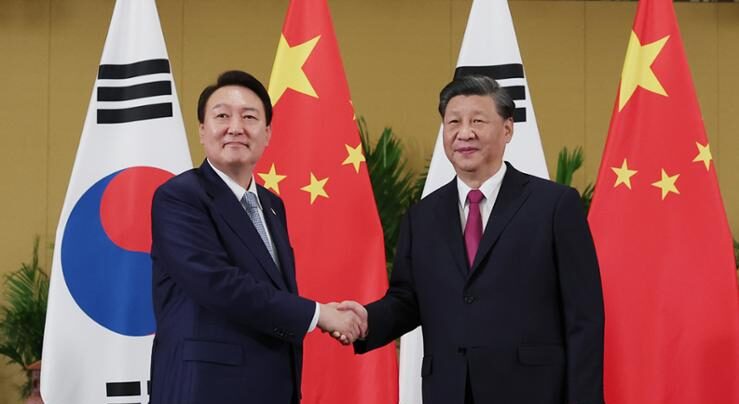Relations between South Korea and China appear to be warming as the two Asian neighbors commemorate the 32nd anniversary of their diplomatic relations on Saturday. Diplomatic observers said, Friday, that a series of recent bilateral exchanges signal Beijing’s willingness to mend fences.
The relationship between the two nations have deteriorated under President Yoon Suk Yeol who took office in May 2022. His administration’s foreign policy, which emphasizes ties with like-minded nations such as the United States and Japan to counter North Korean threats, has been perceived by Beijing as South Korea aligning with U.S.-led efforts to encircle China.
However, recent weeks have seen notable exchanges in trade, people-to-people interactions, and military sectors between Seoul and Beijing.
“We are witnessing a markedly different atmosphere compared to last year when China showed virtually no willingness to improve relations,” said Lee Sang-man, head of the China Research Center at Kyungnam University.
Earlier this week, South Korea’s Trade Minister Jeong In-kyo traveled to Jinan, China, for the seventh South Korea-Shandong Economic and Trade Cooperation Exchange Meeting. This was the first in-person meeting in five years. Shandong Province is a key hub for the supply chain cooperation between the two nations, especially in the automotive sector.
Last week, a group of 48 young South Koreans visited China for a week, signaling the resumption of the South Korea-China youth exchange program after a five-year hiatus. The program, aimed at fostering mutual cultural understanding, will see Chinese youth visiting South Korea next year.
Notable exchanges have also occurred in the military sector, traditionally one the most sensitive areas of bilateral relations.
According to South Korean military sources, the defense ministries of South Korea and China conducted a military hotline inspection for the first time in four years in late July. During the working-level meeting in Beijing, officials discussed ways to improve call quality. The meeting was held privately, and details were not publicly disclosed.
Observers suggest that Beijing’s efforts to mend ties with Seoul may stem from unease within China’s leadership about the growing relationship between North Korea and Russia. The deepening ties between the two countries, including the potential for weapons trade, have unsettled Beijing, which has traditionally been North Korea’s main patron.
“China’s increased engagement with South Korea is partly related to its strained ties with North Korea,” said Lee. “From North Korea’s perspective, China isn’t being as supportive as it once was. Notably, the Chinese ambassador to Pyongyang was absent from North Korea’s major military parade that took place July 27.”

Kang Joon-young, a professor of Chinese studies at Hankuk University of Foreign Studies, viewed that there seems to be a tactical shift in China’s diplomacy with South Korea, noting that Beijing’s outreach to Seoul reflects its view of South Korea as the weakest link in the Seoul-Washington-Tokyo triangle.
“Previously, China’s policy toward South Korea was focused on pressure — telling us not to get too close to the U.S. and discouraging us from strengthening Korea-U.S.-Japan cooperation. However, the more they pushed, the stronger the Korea-U.S. alliance and trilateral cooperation became,” Kang said.
“China now seems to have realized that continuing to exclude and pressure South Korea would only strengthen the U.S.-led alliances. They appear to be focusing on managing relations with South Korea to prevent the current situation from becoming permanently entrenched,” he added.
Visits by the heads of Chinese local governments to South Korea also signal Beijing’s growing willingness to normalize ties. Xin Changxing, secretary of the Jiangsu provincial committee of the Communist Party of China, visited Seoul in June, following Hainan Province Governor Liu Xiaoming’s visit the previous month.
With this changing dynamic, there is speculation that the South Korean president may hold a bilateral meeting with Chinese Premier Li Qiang during the ASEAN leaders’ summit in October in Laos. If it occurs, this would be their meeting in five months since the last one held in May in Seoul.
There is also optimism that the current positive momentum could result in a visit by Chinese leader Xi Jinping to Seoul next year, as South Korea is set to host the Asia-Pacific Economic Cooperation (APEC) summit, which Xi typically attends. Since the start of President Yoon’s term, there have been no official visits between the leaders of South Korea and China.
Lee emphasized that South Korea should leverage this momentum and pursue more flexible diplomacy, broadening its foreign policy beyond the current focus on Seoul-Washington-Tokyo trilateral cooperation.
“China remains a crucial player in addressing North Korea’s nuclear issues. Our national interest lies in maintaining a strategic balance between trilateral cooperation with the U.S., Japan and bilateral relations with China,” the professor said. ( Source: Korea Times )


